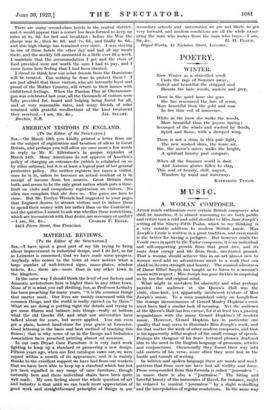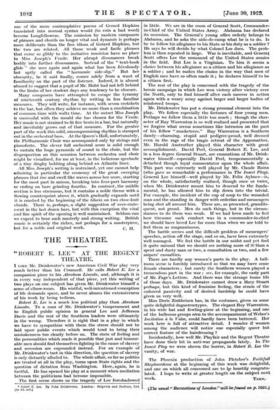MUSIC.
A WOMAN COMPOSER.
AFTER much enthusiasm over certain British composers who shall be nameless, it is almost reassuring to see both public and critics turn a cold and solid shoulder to Miss Jane Joseph's setting of the Ninety-Fifth Psalm, which to my thinking is a very notable addition to modern British music. Miss Joseph's Venite is written in a great tradition, and even music is the better for having a pedigree. But however much the Venite owes in spirit to the Tudor composers, it is an individual and self-supporting growth from that great tree, and its roots draw energy and life from fresh, unvitiated ground: That a woman should achieve this in an art almost new to women need add no adventitious merit to a work that can stand on its own strength and beauty. The musical adroitness of Dame Ethel Smyth has taught us to listen to a woman's music with respect ; Miss Joseph has gone further in surprising us by her fine and original mind.
What might be mistaken for obscurity and what perhaps puzzled the audience at the Queen's Hall was the virile, close-knit, yet apparently incoherent texture of Miss Joseph's music. To a man nourished solely on Longfellow the strange inconsonances of Gerard Manley Hopkins's verse must have had a similar lack of meaning. Yet the audience at the Queen's Hall has less excuse, for it at least has a passing acquaintance with the many Gerard Hopkins's of modern music. However, Gerard Hopkins has in particular one quality that may serve to illuminate Miss Joseph's work, and for that matter the work of other modern composers, and that is his apparently wilful neglect of the small coinage of speech. Perhaps the clangour of his fierce tortured phrases deafened him to the need in the English language of pronouns, articles and conjunctions. Occasionally they found their way into odd corners of his verse, more often they were lost in the bustle and tumult of writing.
In written and spoken language there are words and word- patterns that from over use have lost all virility and force. Prose compounded from this formula is called " journalese " : in music there is also a " journalese." The biting and forceful beauty of the harmonies of Ravel, for instance, might be reduced to musical " journalese " by a slight reshuffling and the interpolation of regular resolutions. In .the same way one of the more contemplative poems of Gerard Hopkins translated into normal syntax would (to coin a bad word) become Longfellowese. The omission by modern composers of phrases and chords no longer vital and dynamic is perhaps more deliberate than the free idiom of Gerard Hopkins, but the two are related. All those weak and facile phrases that come so glibly to the imitative musician have no place in Miss Joseph's Venite. Her abrupt dissonances break bodily into further dissonances. Instead of the " text-book glide " she uses again and again what has been frivolously but aptly called the " harmonic side-slip." But her obscurity, be it said finally, comes solely from a want of familiarity on the part of the listener. Indeed, it is almost absurd to suggest that a pupil of Mr. Holst had not left behind in the limbo of her student days any tendency to be obscure.
Many composers have attempted to escape the tyranny of nineteenth century rhythm by writing in less familiar measures. They will write, for instance, with seven crotchets to the bar, but often they achieve no more than a combination of common time with waltz time. At the outset Miss Joseph is successful with the mould she has chosen for the Venite. Her music is not strained to fit five beats in a bar, but naturally and inevitably grows out of that measure. For the greater part of the work this solid, uncompromising rhythm is stamped out in the orchestral bass. At the Queen's Hall, unfortunately, the Philharmonic Choir was accompanied only by strings and pianoforte. The clever full orchestral score is solid enough to sustain the huge pyramids of sound in the choir, but the disproportion on this occasion between orchestra and choir might be visualized, for me at least, in the ludicrous spectacle of a tiny dinghy bobbing along behind an Atlantic liner.
All Miss Joseph's writing is restrained, yet one cannot help admiring in particular the economy of the great sweeping phrases that rise and swell like waves across her score, starting for the most part in unison, breaking into four-part harmony or ending on bare grinding fourths. In contrast, the middle section is less strenuous, but it contains a noble theme with a flowing counterpoint above it, which gradually expands until it is crushed by the beginning of the Gloria on two close-knit chords. There is, perhaps, a slight suggestion of over-state- ment in the last dozen bars, but with this exception the vital and fine spirit of the opening is well maintained. Seldom can we expect to hear such masterly and strong writing. British music is certainly the richer, not perhaps for a masterpiece, but for a noble and original work. C. H.











































 Previous page
Previous page